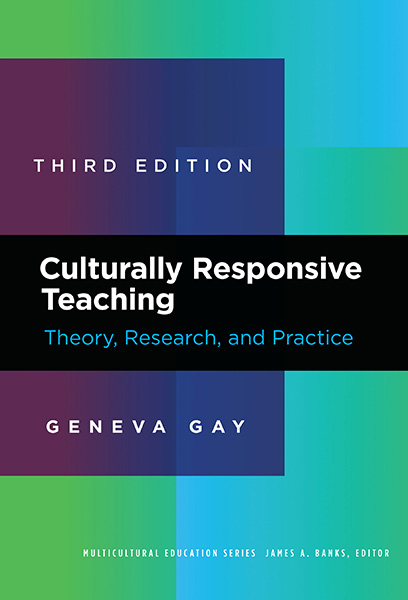Professors: Request an Exam Copy
Print copies available for US orders only. For orders outside the US, see our international distributors.
Third Edition
Publication Date: January 26, 2018
Pages: 384
Series: Multicultural Education Series

Multiple-award-winner Geneva Gay has updated her foundational text for culturally responsive teaching to keep it relevant for today’s diverse students. This perennial favorite is the go-to resource for teacher professional learning and education courses.
Geneva Gay is renowned for her contributions to multicultural education, particularly as it relates to curriculum design, professional learning, and classroom instruction. Gay has made many important revisions to keep this foundational text relevant for today’s diverse student population, including: new research on culturally responsive teaching, a focus on a broader range of racial and ethnic groups, and consideration of additional issues related to early childhood education.
Combining insights from multicultural education theory with real-life classroom stories, this book demonstrates that all students will perform better on multiple measures of achievement when teaching is filtered through students’ own cultural experiences. This perennial bestseller continues to be the go-to resource for teacher professional learning and preservice courses.
While retaining its basic organization and structure, the Third Edition features:
Geneva Gay is professor of education at the University of Washington–Seattle. She is the recipient of several awards, including the first Multicultural Educator Award presented by the National Association of Multicultural Education. She received the 2023 AERA Division B (Curriculum Studies) Lifetime Achievement Award.
“While the structure and premise of the book remain unchanged, the third edition responds to the question educators continue to ask: How do we do it?...This book is an invaluable resource to preservice and inservice teachers as well as teacher educators. Gay continues to challenge the reader to be proactive and stay the course. She offers a framework that remains relevant and continues to challenge us to do better, reminding us that the need for culturally responsive teaching persists.”
—Teachers College Record
“Beginning with the assertion that the PreK–12 educational system as it exists now is inequitable, particularly for children of color, Gay demolishes the deficit-based models of achievement remediation, instead arguing for a more holistic appreciation for the gifts and strengths children from diverse cultural backgrounds bring to the classroom environment and how teachers can better prepare to act in culturally-responsive ways.”
—The Wabash Center Journal on Teaching
"A comprehensive account of the important role that culture plays in the teaching and learning process."
—Urban Education (for previous edition)
"Inspiring! A book every teacher should read. As one of the founders of the field of multicultural education, Gay has updated her exceptional resource for teachers."
— Valerie Ooka Pang, San Diego State University
"Gay clearly explains how culturally responsive teaching can be used to dramatically influence the academic achievement of students of color and other marginalized students."
—Carl A. Grant, University of Wisconsin at Madison (of previous edition)
Table of Contents
Series Foreword
Acknowledgments
Preface to the Third Edition
Chapter 1. Challenges and Perspectives
Introduction
The Need for and Nature of Story
A Personal Story and Symbol of a Trend
Achievement Challenges
Assertions about Improving Student Achievement
Conclusion
Practice Possibilities
Chapter 2. Pedagogical Potential of Cultural Responsiveness
Introduction
From Can’t to Can
Ideological Beginnings
Culturally Responsive Teaching Personified
Roles and Responsibilities of Teachers
Conclusion
Practice Possibilities
Chapter 3. The Power of Culturally Responsive Caring
Introduction
Overview of Caring Characteristics
Attributes of Caring in Detail
Expectation Trends and Effects
Actualizing Culturally Responsive Caring
Conclusion
Practice Possibilities
Chapter 4. Culture and Communication in the Classroom
Introduction
Relationship among Culture, Communication, and Education
Myths about Language Diversity
Cultural Communication Controversies
Effects of "English Plus" Instruction on Student Achievement
Variations in Ethnic Discourse Styles
Gender Variations in Discourse Styles
Conclusion
Practice Possibilities
Chapter 5. Ethnic and Cultural Diversity in Curriculum Content
Introduction
Importance of Textbooks as Curriculum Content
Ethnic and Cultural Diversity in Different Texts
Standards, Testing, and Diversity
Ethnic Diversity in Literary and Trade Books
Mass Media as Cultural Curriculum Content
Culturally Diverse Curriculum Content Effects
Improving Culturally Diverse Curriculum Content
Conclusion
Practice Possibilities
Chapter 6. Cultural Congruity in Teaching and Learning
Introduction
Learning Styles Baseline
Funds of Knowledge and Cultural Self-Study
Cooperative Learning
Active and Affective Engagement
Social and Emotional Learning (SEL)
Conclusion
Practice Possibilities
Chapter 7. A Personal Case of Culturally Responsive Teaching Praxis
Introduction
Being Supportive and Facilitative
Rituals and Routines
Learning Cooperatively and Successfully
Choice and Authenticity Are Essential to Learning
Teaching to Enable and Empower
Knowledge Plus Practice Is Imperative
Cultivating Critical Orientations Is Important
The Personal Is Powerful
Conclusion
Chapter 8. Epilogue: Looking Back and Projecting Forward
Introduction
Culturally Centered Incremental Efforts Make a Difference
Confronting Convention and Resisting Resistance
Culturally Responsive Teaching Benefits Comprehensively
Where to Begin and When to End
Alternative Paradigms for Practice
Challenges and Invitations
Now Is the Time
Pillars for Progress
Conclusion
References
Index
About the Author
2023 AERA Division B (Curriculum Studies) Lifetime Achievement Award, to Geneva Gay
Professors: Request an Exam Copy
Print copies available for US orders only. For orders outside the US, see our international distributors.